Insight & Strategy: #TheMassiveOvershare and #LoveBeatsLikes
How Maltesers sparked conversation and united women through laughter to destigmatise maternal mental health
This article was originally published in Contagious I/O on 15 December 2021
Share this post
In 2021, Mars-owned confectionery brand Maltesers launched a two-part campaign focusing on bringing awareness and support to maternal mental health.
First, in March, Maltesers launched #TheMassiveOvershare, in partnership with charity organisation Comic Relief and AMV BBDO, London.
The social-led campaign encouraged mums across the UK to openly share the highs and lows of motherhood in an effort to ensure that maternal mental health is better understood and recognised. Maltesers used the #TheMassiveOvershare hashtag to provoke discussion and then amplified user-generated content online and through outdoor ads.
The campaign was designed to help mums talk about the tougher parts of motherhood and guide them about where to turn for clinical support as and when required. The brand also launched two TV spots that showcased experiences of motherhood, inspired by conversations with new mums.
Then, in November, Maltesers launched a second phase of the campaign, #LoveBeatsLikes, to encourage people to go beyond social media Likes and properly check in with the mums in their life.
Core to this extension is Maltesers’ partnership with broadcaster Channel 4 called Late Night Feed, a one-off comedy special featuring Ellie Taylor (stand-up comic, broadcaster, actress and author of The Sunday Times bestseller My Child and Other Mistakes: How to Ruin Your Life in the Best Way Possible), as well as comedians Athena Kugblenu and Jessica Fostekew. Maltesers shared clips on the special highlighting the importance of maternal mental health across Channel 4’s YouTube, Facebook and Instagram channels and also put out a linear TV ad featuring the comedians.
Over the next three years, money donated by Maltesers will help Comic Relief in its work supporting women with maternal mental health issues through projects like The Happy Mums Foundation and Smile Group.
To find out more about why Maltesers set out to destigmatise maternal mental health and the challenges of running a social-led campaign, we spoke to Maltesers brand director Leah Dyckes, AMV BBDO strategy director Emily Brydon, and creative directors Jeremy Tribe and David Westland. They told us:
- Breaking down taboos requires brands to act responsibly, to provide support and show up for the audiences they’re affecting
- Handing over control to the audience is necessary for destigmatising work, and requires a balance of careful planning and letting go
- Trusting partners to amplify your idea is scary, but essential for this type of stigma-smashing work, and ultimately what makes the idea resonant and successful
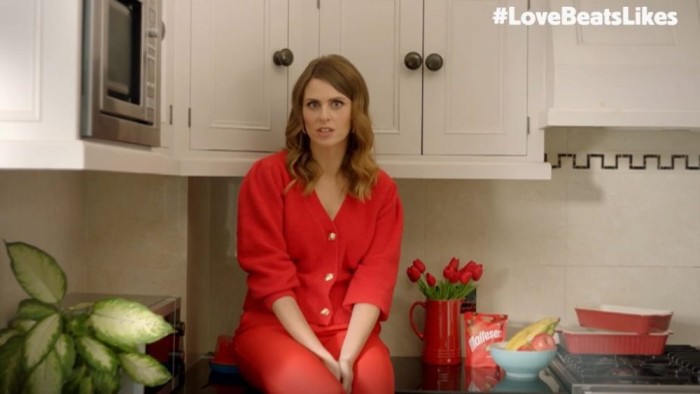
Can you give an overview of the brand and how it’s evolved over the past couple of years?
Emily Brydon: Maltesers has a long-standing purpose of uniting people through the power of laughter and togetherness. That originally was inspired by the lightness of the product many years ago and the claims that we had around that.
Where we've evolved the brand in the last decade is from talking about product lightness to celebrating shared moments of lightness. Maltesers’ product is most frequently consumed in these casual moments between friends, when you sit together on the sofa and you have a glass of wine. And while in the confectionery segment those might not be the most aspirational occasions to be connected with, we love them, because they are those intimate moments where you laugh together about the stuff that life has thrown at you that week.
Laughter can sometimes seem frivolous, but it’s important because it helps us to cope, build and heal. That is the insight that’s led to the evolution of the brand over the past few years and is particularly pertinent around maternal mental health as we’ve been encouraging more conversations between women and between women and their families.
Leah Dyckes: We want to help make a difference in the debates, conversations and issues which impact our consumers. Maltesers has a long history of showcasing the power of female friendship and laughter in breaking down taboos and getting through the tough stuff.
Over the past couple of years, mental health and resilience have become increasingly important topics for our consumers and so it was a natural evolution to begin talking openly about mental health.
Creativity has to work harder and we see that as a positive constraint because it pushes us to think differently about the way that we're adding value to people's lives.Emily Brydon, AMV BBDO
What are the key challenges Maltesers faces today?
Brydon: All advertisers are facing an increasingly complex and fragmented media landscape. We’ve got more ways to reach people, but it’s harder to have the same impact with our communications. For us, that has meant that creativity has to work harder and we see that as a positive constraint because it pushes us to think differently about the way that we're adding value to people's lives.
In the UK, specifically, we’ve got one of the most loved and iconic brands, but we don’t want to be complacent about that position. That’s an earned trust and so we take our responsibility to represent the communities we serve seriously.
Maltesers is well known for its work around disability representation; what triggered the shift to maternal mental health?
Brydon: We've got to an interesting space over the past 12 months, that does look a little bit different to where we’ve been before. Maltesers has chosen to destigmatise the conversation around maternal mental health because it’s a topic that desperately needed attention in the UK.
We’ve always used our communications and our incredible brand platform of ‘look on the light side’ to bring lightness to the world. The shift we’ve made is we’ve become more focused on tangibly making the tough stuff women face a little lighter.
This latest work is less about encouraging a perspective shift, and more about those brand actions that make the world a little bit of a lighter place or a little bit better for women. The big shift here was that it very much required an integrated activation, not just an ad.
Dyckes: Maltesers has a long-running history of positively progressing the representation of women in advertising with real and honest portrayals of their experience. An exploration of motherhood felt like a natural extension of what we’ve always done.
Through research with our charity partners, we heard stories of women laughing through the tough stuff of maternal mental health and coming out stronger, which is what our adverts and wider campaign work aims to encourage.
Was there any hesitancy internally about approaching this topic?
Dyckes: This is our first step in exploring a very complex conversation. We instantly knew it was the right area to focus on, but a top priority was to ensure we did it in a way that was sensitive and understanding to all those impacted by maternal mental health.
How did you sell the idea to stakeholders internally?
Dyckes: We want and need to use our platform to break down barriers and taboos in mainstream media. From our point of view, we think that it makes good business sense to be representing greater diversity through our ads and partnerships – not only is it the right thing to do, but we are also getting closer to a wider cross-section of consumers.
How did you identify that maternal mental health was the area that you were going to destigmatise?
Brydon: We have a long-term partnership with Comic Relief that has existed for the past 10 years. Typically, that has taken the approach of a monetary partnership, but what we wanted to do this year was think about how we can use Maltesers’ brand profile – it’s such a loved and iconic brand in the UK – to do more for the charities that we were supporting.
We got to maternal mental health by looking at the experience that mums specifically have faced over the past two years. They have been one of the communities that have been disproportionately impacted by the pandemic.
We think that it makes good business sense to be representing greater diversity through our ads and partnerships – not only is it the right thing to do, but we are also getting closer to a wider cross-section of consumers.Leah Dyckes, Maltesers
The partnership with Comic Relief started a decade ago, what was the initial thinking behind the partnership?
Brydon: Comic Relief believes that funny is power and that is a shared value that both our brands have. It was a natural partnership that developed between the two brands based on the truths around laughter and its ability to reduce division in the world.
Were you worried about alienating your broader audience as you narrowed your focus to maternal mental health?
Dyckes: Becoming a mum is an experience that many people go through. We also all have friends and family who we deeply care about who are mums. So, we did not see it as narrowing our focus but rather focusing on an issue area that we knew had huge scale and where we hoped we could make a difference to by making it a more salient and better understood topic among the entire population.
Brydon: What’s interesting about our communications is we share universally resonant insights. So even if you look at the disability work, while that represented that audience and their experiences, at the heart of those spots were very relatable moments. Whether that’s dating woes through to the shenanigans that happen at a wedding – those moments were universally resonant for a much broader audience.
When we’re talking about maternal mental health, it’s something that we feel strongly needs to be on everyone’s agenda. It’s not just a woman’s issue. It’s something that affects families more broadly. And so, while we have spoken about that issue and we’ve engaged lots of women on that issue, we were also really cognisant that we wanted to engage men as well, and the communities that surround the new mums in our lives.
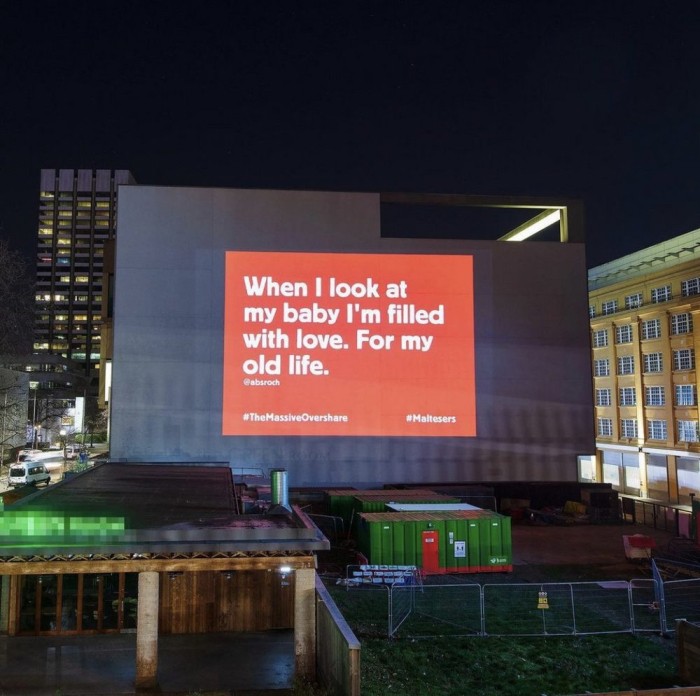
How do the two parts of the campaign – #TheMassiveOvershare and #LoveBeatsLikes – link together?
Brydon: The piece that hangs everything together is our long-term partnership with Comic Relief. The first phase of the campaign was about normalising conversation around the realities of motherhood. That came off some research that one in 10 women experience maternal mental health, but seven in 10 hide or underplay the severity of the issue. So that was the most natural starting point for us: how do we normalise and destigmatise the conversation so that we’re able to talk about what we’re going through and there’s better detection and better diagnosis.
With the second half of the campaign, we really wanted to open up the dialogue with a broader audience. We wanted to start talking to the communities around mums and to get them to be the village that they need.
Did you know there would be two phases to this campaign when you set out?
Brydon: The ask was to raise the profile of maternal mental health so that we see better understanding of the issue, so we knew we wanted to do something throughout the whole year – this couldn't have been a one-and-done thing for Maltesers. We needed to show commitment to it and that meant creating conversations and keeping them alive. We needed to plan spikes of activity to be able to do that.
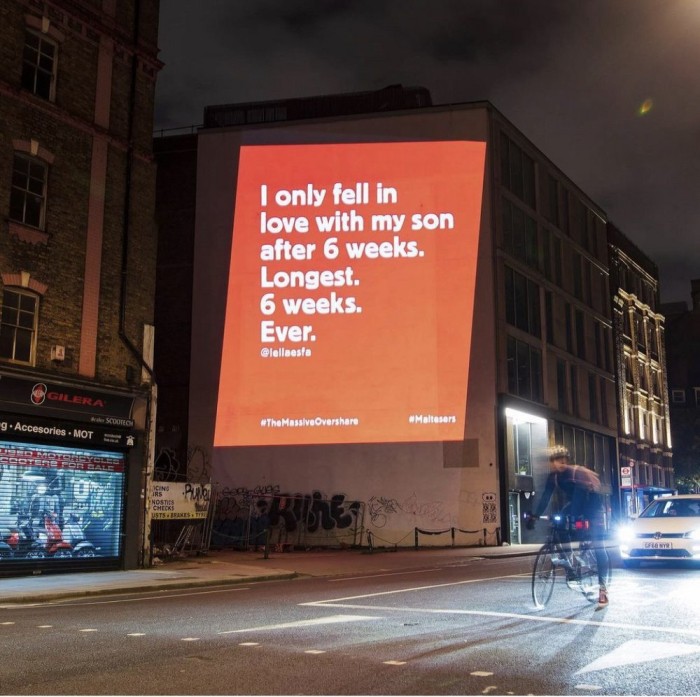
Did you play a role in conducting the research? What key stats stood out?
Dyckes: Yes, we worked closely with Comic Relief and the Maternal Mental Health Alliance when gathering our research – it really hit home for so many of us in the team. I’m a mum, many of us are mums, and we really saw that the shame and stigma that can often be attached to maternal mental health prevents people from getting the support they need.
One key stat that especially highlights the need for support is that seven out of 10 mums don’t seek support for fear of judgement, which informed #TheMassiveOvershare and why we decided to provide a safe space for mums to share how they were really feeling.
We also found out from our study of 1,000 UK mums who had their child in the past five years that almost half admitted to using social media as a distraction from feeling lonely during their first year as a parent. Our research showed that 32% felt their friends and families don’t know what to say or how to help a new mum.
These findings together with the new research from the Maternal Mental Health Alliance about mums’ experience during the pandemic informed our thinking around #LoveBeatsLikes.
Brydon: Throughout the creative development process we also had access to women who had lived experience. As a team that gave us more insight than any kind of research or survey ever could because we were able to bring their experiences to life and hear about what they've been through first-hand, which is so, so valuable to getting it right.
What was your initial response to the brief?
Jeremy Tribe: From a personal perspective it's something that I feel quite strongly about. When we had our first child, my wife went through a very difficult time and then we had our second child in the pandemic and the conditions were different once again.
I felt strongly that if Dave [David Westland] and I could create some ideas, they were ideas that we should give to the communities to then play out in the social space. If we could create something that has enough stickiness to open up conversations among mums themselves, and then in the second phase among the broader audience (which is anyone who knows mums or partners of new mothers), then that would be a really exciting and powerful thing to do.
How did the idea for the campaign come about?
Tribe: #TheMassiveOvershare came about from the demonisation of when you share things that seem to be unpalatable on social media platforms.
You've got these swathes of mothers who are presenting their best self to the world and there's a little bit of pushback when something difficult gets placed into that arena. We wanted to say it’s okay and embrace that idea of the overshare.
We decided if you’re going to call this oversharing, let’s embrace it and make it big and try to liberate some of those truths that people feel self-conscious about sharing. Hence taking real things that women had come back to us and said and putting them up on buildings, literally making them massive overshares, without being too funny about it.
With the second phase, where we were trying to do something that would resonate more with friends and family surrounding new mums, we looked at the proliferation of Likes on mums' social media posts and how powerful it might be to intervene in that moment and ask people whether there’s something more that they can do (than press a Like button) to be supportive. Social media is a really great tool for connection and belonging, but it also becomes an expedient substitute for real supportive action.
David Westland: Oversharing is often deemed to be negative, so we flipped it to turn it into a positive and make it even bigger. And then we flipped the conversation about Likes and suggested maybe you should just check in.
How did the social-led aspect to the campaign impact the way you created #LoveBeatsLikes?
Tribe: We're not really writing the work. We’re trying to drop provocations into the right spaces and let the people that are living the thing create the content.
There’s more focus on the creative development of that central premise and then gathering the right partners and the right voices so that it has some sort of social traction or stickiness to get people gathering around it and creating conversations. Because ultimately, it’s the conversation that that needs to happen to make the topic less taboo.
Every mother's experience is going to be different. It's a very sensitive topic, some issues will be quite triggering for certain mothers and others not, but if you let the conversation be in their hands, then that's empowering for them.
How did you figure out how far to push your provocations on such a sensitive topic?
Westland: As long as there was a truth to it, then you had permission to work with it. Maltesers were keen not to sensationalise anything for the sake of advertising or humour. We also checked off all the work with the partners. Some flags were raised and we had to pull back from certain topics or use of certain language.
Tribe: From a brand level, Dave and I were trying to keep true to that brand thing of not just being able to talk about it, but also being able to take a moment to smile or laugh about it. But then once it was out there in the communities, people were taking it to some much more serious places.
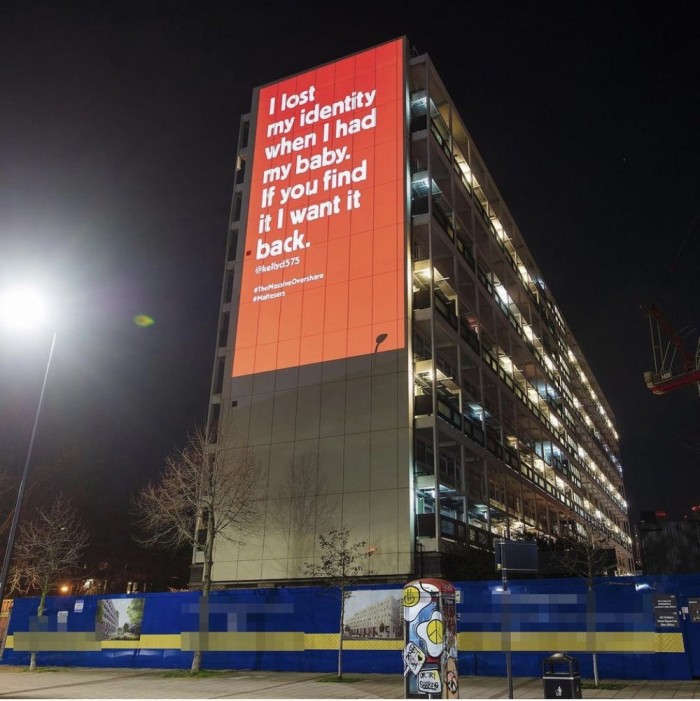
Where were the boundaries of something being too sensitive?
Brydon: There are a lot of pressures on women and new mums, and particularly around breastfeeding, which is a really polarising conversation. We have to be really careful if we’re going to talk about that, because you don’t want to add to the shame or to the pressure.
There's some really sensitive parts of the conversation where there's existing debate and it wasn't right for Maltesers to have a point of view on those.
Tribe: We wouldn’t necessarily express a point of view around, say, breastfeeding, but you can’t ignore it because that is one of the core trigger points for the way that mums feel about whether they are succeeding in that transition into being a mum – it comes up time and time again. So while we were trying not to have a point of view on it, the conversation opens up because it’s mums doing it themselves.
How did you navigate that?
Brydon: We were very clear to signpost help at every touchpoint throughout the campaign. Within all our social assets, you could click through to a resource hub that links through to charities in the space and NHS contacts available.
We also had active community management throughout the campaign, so if a particularly sensitive response was shared, we would be signposting through to that resource hub. All of the influencers were equipped with that information as well, so that if they were getting specific comments that were worrying, they were able to respond to that.
Everyone was armed and educated in how to be there for mums. If you’re going to ignite a conversation around this, you need to be present in it and do the responsible thing.
How did the media plan impact the creative?
Brydon: For a campaign like this, the medium has been as important as the message. We’ve tapped into influencers and ambassadors and partnerships to be able to immerse people in the full spectrum of motherhood, whereas what comes from the brand looks slightly different. That’s enabled us to have that combined approach of branded message versus the experiences that need to come from real women.
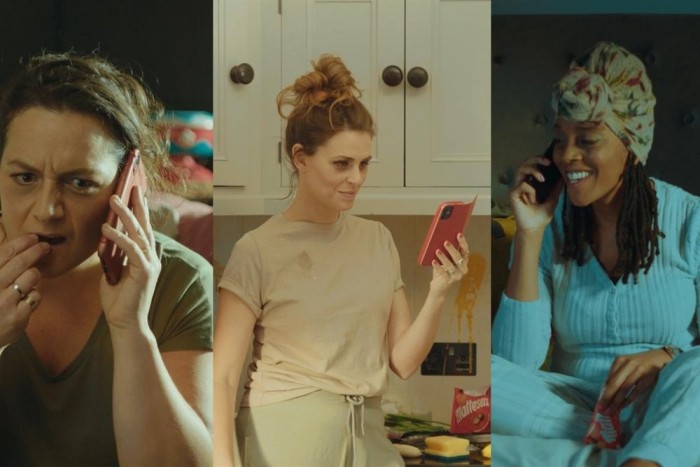
The first phase of the campaign kicked off with a TV ad and the latest element is the content series, Late Night Feed, with Channel 4. Why did you take that approach?
Brydon: We wanted this to reach beyond mums. The TV campaign, out of home campaign and the content series were all really important channels to making sure that the real experiences of mums were seen by their friends and families, in the hope that it was a gentle nudge to reappraise the way that they’re supporting the new mums in their lives.
Throughout the campaign, there have been a few different pillars to the communication. We’ve used an ambassador and consumer press to shed light on the issue. The research has enabled us to show the scale of the issue in the UK. We’ve used the social elements to create this new norm in the social sphere. And our more recent partnerships have been all about shifting community behaviour.
If you need a 50 page PowerPoint presentation, then the idea is too complicated to be picked up anyway.David Westland, AMV BBDO
Can you tell me more about working with Channel 4?
Tribe: We had pitches in from different partners. Of course, Channel 4 are excellent around social issues and diversity, so it’s no surprise that they came back with such a strong piece of work.
Our brief to them was: ‘We're looking for truthfulness. Can you do something with comedians who have recently become mothers and can talk about it in a way that is very, very truthful, and at times even painful, but also painfully funny.’
Then the words were written by the comedians – we got oversight and we talked about refining it and making it a little bit more focused but it’s a very light touch thing from a creative direction point of view.
It’s putting trust in the kernel of the idea and putting trust in the partners that are going to then write it. It’s the opposite of your usual obsessive creative, poring over every line and rotating full stops and all that kind of stuff. And it’s the way that it has to be around a topic like this.
Brydon: When conversations are a KPI, you have to have that trust in your partners and the influencers to bring the idea to life in the most authentic way. So, it was a different way of working, but it was imperative to give them that room to bring it to life through their real voices.
Westland: We just had to act as brand and idea guardians on this one. At one point, we were asking them to push the humour a bit more because that's the Maltesers humour – they call it a little 'spit the tea out' moment. It's an important issue, we want people to see it and react to it.
What was the kernel of the idea that you handed over to your partners?
Tribe: Once we got to the lines 'The Massive Overshare' and 'Love Beats Likes', it was just a couple of sentences about what that means to then pass over. It was quite skeletal, really.
Westland: If you need a 50 page PowerPoint presentation, then the idea is too complicated to be picked up anyway.
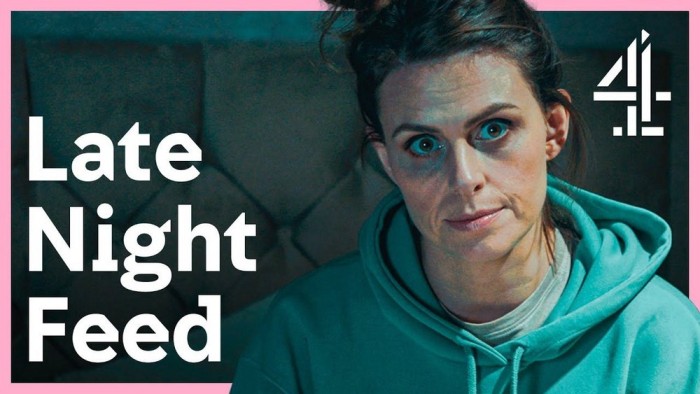
Tell us about your partnership with publishers Black Ballad and Gay Times.
Brydon: It is the first time we've partnered with Black Ballad and Gay Times and it’s been an amazing experience. We knew from the very beginning, from having one-on-one conversations with women who have lived experience of maternal mental health, that none of their experiences were the same.
So engaging a diverse group of influencers, and engaging these partners, was really important to make sure that we were able to not only represent those diverse experiences that we’d heard, but also to help them via the platforms that made sense. They’ve been able to create amazing content across all the touchpoints within their ecosystems that has reflected the experiences of the communities that they talk to. So that’s been really powerful. It’s definitely something that we’ll continue to do on an ongoing basis, because it’s been such a positive and well-received part of the campaign.
The big challenge for us creatively was that we needed to inspire a real conversation. That’s no mean feat, especially from a chocolate brand.Emily Brydon, AMV BBDO
What were the results from #TheMassiveOvershare?
Dyckes: We saw over 1,000 mums participate in #TheMassiveOvershare social campaign. As a result, we saw the highest volume of social conversation in Maltesers’ history and a 46% increase in social conversations around maternal mental health in the campaign period.
We saw over 104,000 visits to the support page, which provides vital resources for mums, friends and family struggling with the impacts of maternal mental health.
How are you measuring the success of the latest phase?
Dyckes: We are continuing to monitor the volume of social conversation on Maltesers and maternal mental health. We are also continuing to ensure that we signpost people to the support page, which has now seen nearly 200,000 visits.
Brydon: #LoveBeatsLikes is certainly a harder one to put those metrics behind because it’s about real behaviour change. It’s about more cups of tea made and more phone calls and more nappies changed by friends and family. We are keeping a close eye on inquiries with our charity partners and the Maternal Mental Health Alliance to help us to understand whether this campaign has resulted in more inquiries, versus last year and the years before.
What were the biggest challenges of the campaign?
Brydon: The big challenge for us creatively was that we needed to inspire a real conversation. That’s no mean feat, Especially from a chocolate brand. We couldn’t go out with a stunt and call it a day. We developed a really integrated campaign that continues to fuel conversation throughout the entire year.
Westland: Treading that fine line between what we can say, should say, want to say, need to say and making sure we were responsible all the way through. It was very much a collaborative process between us, the partners, the client, and the charities. That tightrope was easier to walk than if we'd been left to our own devices.


